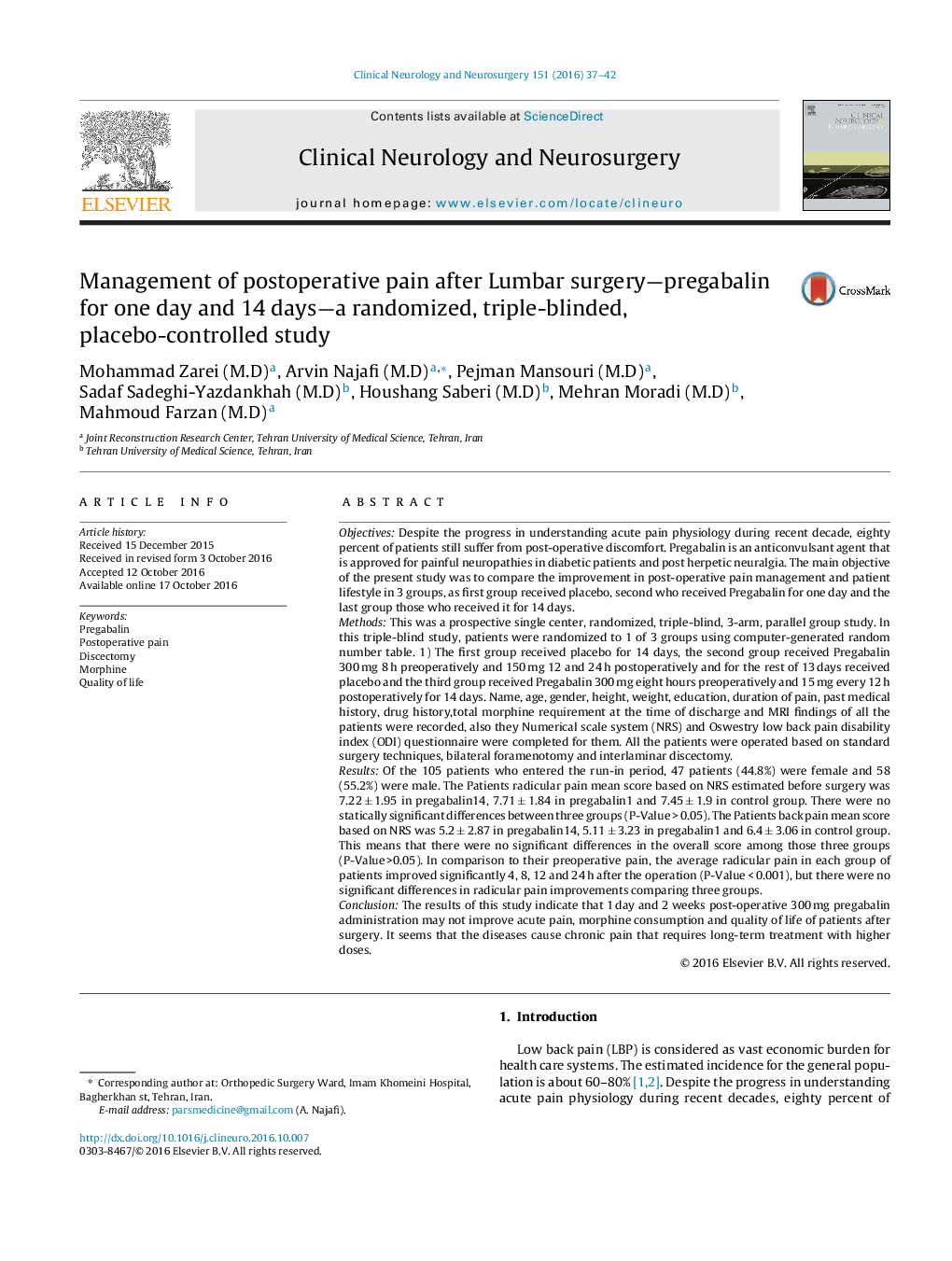| کد مقاله | کد نشریه | سال انتشار | مقاله انگلیسی | نسخه تمام متن |
|---|---|---|---|---|
| 5627084 | 1579671 | 2016 | 6 صفحه PDF | دانلود رایگان |

- 1Â day use of 300Â mg pregabalin may not improve postoperative pain lumbar surgery.
- 14Â days use of 300Â mg pregabalin may not reduce postoperative pain lumbar surgery.
- Postoperative pain management may requires long-term treatment with higher doses.
- Pregabalin may not reduce morphine consumption postoperative pain lumbar surgery.
ObjectivesDespite the progress in understanding acute pain physiology during recent decade, eighty percent of patients still suffer from post-operative discomfort. Pregabalin is an anticonvulsant agent that is approved for painful neuropathies in diabetic patients and post herpetic neuralgia. The main objective of the present study was to compare the improvement in post-operative pain management and patient lifestyle in 3 groups, as first group received placebo, second who received Pregabalin for one day and the last group those who received it for 14 days.MethodsThis was a prospective single center, randomized, triple-blind, 3-arm, parallel group study. In this triple-blind study, patients were randomized to 1 of 3 groups using computer-generated random number table. 1) The first group received placebo for 14 days, the second group received Pregabalin 300 mg 8 h preoperatively and 150 mg 12 and 24 h postoperatively and for the rest of 13 days received placebo and the third group received Pregabalin 300 mg eight hours preoperatively and 15 mg every 12 h postoperatively for 14 days. Name, age, gender, height, weight, education, duration of pain, past medical history, drug history,total morphine requirement at the time of discharge and MRI findings of all the patients were recorded, also they Numerical scale system (NRS) and Oswestry low back pain disability index (ODI) questionnaire were completed for them. All the patients were operated based on standard surgery techniques, bilateral foramenotomy and interlaminar discectomy.ResultsOf the 105 patients who entered the run-in period, 47 patients (44.8%) were female and 58 (55.2%) were male. The Patients radicular pain mean score based on NRS estimated before surgery was 7.22 ± 1.95 in pregabalin14, 7.71 ± 1.84 in pregabalin1 and 7.45 ± 1.9 in control group. There were no statically significant differences between three groups (P-Value > 0.05). The Patients back pain mean score based on NRS was 5.2 ± 2.87 in pregabalin14, 5.11 ± 3.23 in pregabalin1 and 6.4 ± 3.06 in control group. This means that there were no significant differences in the overall score among those three groups (P-Value >0.05). In comparison to their preoperative pain, the average radicular pain in each group of patients improved significantly 4, 8, 12 and 24 h after the operation (P-Value < 0.001), but there were no significant differences in radicular pain improvements comparing three groups.ConclusionThe results of this study indicate that 1 day and 2 weeks post-operative 300 mg pregabalin administration may not improve acute pain, morphine consumption and quality of life of patients after surgery. It seems that the diseases cause chronic pain that requires long-term treatment with higher doses.
Journal: Clinical Neurology and Neurosurgery - Volume 151, December 2016, Pages 37-42